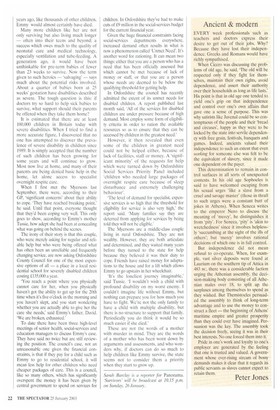Ancient & modern
EVERY week professionals such as teachers and doctors express their desire to get out of their jobs. Why? Because they have lost their independence. Greeks and Romans would have richly sympathised.
When Cicero was discussing the problems of old age, he said, 'The old will be respected only if they fight for themselves, maintain their own rights, avoid dependence, and assert their authority over their households as long as life lasts.' His point is that in old age one tended to yield one's grip on that independence and control over one's own affairs that gave one a sense of purpose. This was why satirists like Juvenal could be so contemptuous of the people and their 'bread and circuses', happy as they were to be locked by the state into servile dependency with free grain, festivals, banquets and games. Indeed, ancients valued their independence to such an extent that even working for someone else was felt to be the equivalent of slavery, since it made one dependent on the payer.
This determination to remain in control surfaces in all sorts of unexpected contexts. In his old age Sophoeles is said to have welcomed escaping from his sexual urges 'like a slave from a cruel and savage master' (those in thrall to such urges were a constant butt of jokes in Athens). When •Seneca writes to the emperor Nero to discuss the meaning of 'mercy', he distinguishes it from 'pity'. For Seneca, 'pity' is 'akin to wretchedness' since it involves helplessly 'succumbing at the sight of the ills of others': but 'mercy' involves rational decisions of which one is in full control.
But independence did not mean refusal to co-operate. When, for example, vast silver deposits were found at Laurium on the southern tip of Attica in 483 BC, there was a considerable faction urging the Athenian assembly, the decision-making body consisting of all Athenian males over 18, to split up the surpluses among themselves to spend as they wished. But Themistocles persuaded the assembly to think of long-term advantage and to use the money to construct a fleet — the beginning of Athens' maritime empire and greater prosperity than they could ever have imagined. Persuasion was the key. The assembly took the decision freely, seeing it was in their best interests. No one forced them into it.
Pride in one's work and loyalty to one's employer are generated by the feeling that one is trusted and valued. A government whose ever-rising stream of bossy demands makes it clear that it regards its public servants as slaves cannot expect to
retain them. Peter Jones


















































































 Previous page
Previous page